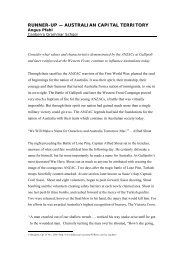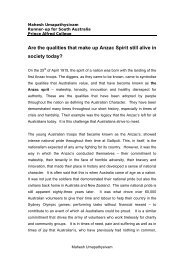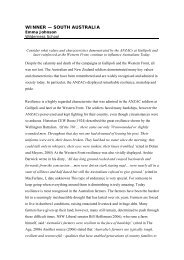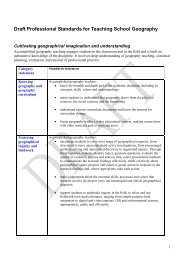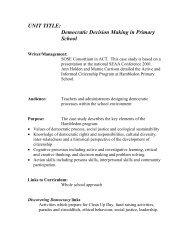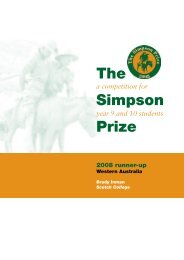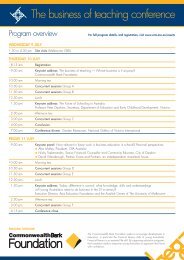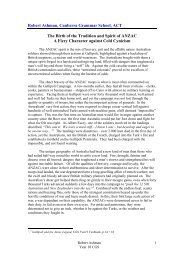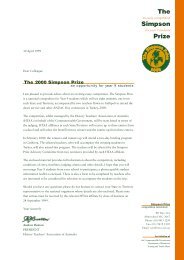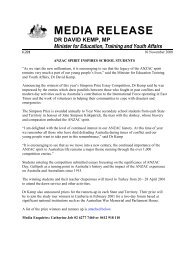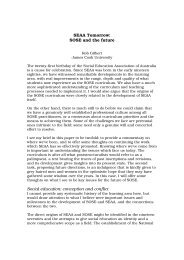Subject combinations VCE Geography - afssse
Subject combinations VCE Geography - afssse
Subject combinations VCE Geography - afssse
Create successful ePaper yourself
Turn your PDF publications into a flip-book with our unique Google optimized e-Paper software.
How will I benefit if I take<br />
<strong>Geography</strong> as a <strong>VCE</strong> subject<br />
“ I enjoy <strong>Geography</strong> and would like to continue but<br />
how will it help me get into university and a job”<br />
<strong>VCE</strong> <strong>Geography</strong> keeps your tertiary options open!<br />
To gain admittance to a tertiary course, you first have to gain an ENTER (Equivalent<br />
National Tertiary Entrance Rank). This is calculated by adding together your Units 3<br />
and 4 results: English, your best three other scores, and 10% of your next two best<br />
scores. In all, up to six subject scores can be used. Figure 1 shows some subject<br />
<strong>combinations</strong>.<br />
There are close to 700 tertiary courses.<br />
<strong>Subject</strong> <strong>combinations</strong><br />
Figure 1<br />
These are guides only, for there are many other sensible and flexible <strong>combinations</strong>, all<br />
using <strong>Geography</strong><br />
Geographers head in the right direction<br />
Humanities/Law<br />
English English English<br />
<strong>Geography</strong> <strong>Geography</strong> <strong>Geography</strong><br />
History History LOTE<br />
Politics Literature Politics<br />
Legal Studies Legal Studies Maths<br />
Engineering<br />
English<br />
Physics<br />
Maths<br />
Maths<br />
Chemistry<br />
<strong>Geography</strong><br />
Graphic Design<br />
English<br />
Graphic<br />
Communication<br />
<strong>Geography</strong><br />
Art<br />
Business/commerce<br />
English<br />
<strong>Geography</strong><br />
Maths<br />
Maths<br />
Accounting<br />
Architecture<br />
English<br />
Maths<br />
Physics<br />
<strong>Geography</strong><br />
Graphic<br />
Communication<br />
English<br />
<strong>Geography</strong><br />
Maths<br />
Economics<br />
Accounting<br />
Cartography<br />
English<br />
Maths<br />
Maths<br />
<strong>Geography</strong><br />
Graphic<br />
Communication<br />
University requirements<br />
Courses list prerequisites. Humanities subjects are generally not<br />
specified. <strong>Geography</strong> is specifically listed at Monash University for the<br />
following courses:<br />
Arts/Science; Biotechnology; Communication/Science; Journalism/<br />
Science; Science; Science Advanced with Honours; Science/Business<br />
and Commerce; Science/Education (Primary); Science/Education<br />
(Secondary); Science/Law.<br />
<strong>Geography</strong> develops and enhances a range<br />
of valuable skills and ideas<br />
Human Science<br />
English<br />
General Science<br />
English<br />
Computing<br />
English<br />
Urban Planning<br />
English<br />
It is a challenging and interesting study which develops the ideas and<br />
skills listed in Figure 2.<br />
Maths<br />
Maths<br />
Maths<br />
Maths<br />
Maths<br />
<strong>Geography</strong><br />
Chemistry<br />
Maths<br />
<strong>Geography</strong><br />
Chemistry<br />
Maths<br />
<strong>Geography</strong><br />
Physics<br />
<strong>Geography</strong><br />
Politics<br />
History<br />
<strong>Geography</strong> graduates find jobs<br />
A survey was undertaken of university graduates who had taken<br />
geography as one of their subjects. Many of these graduates indicated<br />
it was their geography skills and training that primarily helped them to<br />
find professional employment in the areas shown in Figure 3.<br />
<strong>VCE</strong> <strong>Geography</strong><br />
The key ideas of <strong>VCE</strong> <strong>Geography</strong><br />
• assessment of resources<br />
• planning and decisionmaking<br />
• management of resources<br />
useful to people<br />
• problem solving<br />
Figure 2<br />
This requires students to:<br />
• think clearly and broadly<br />
• make associations between ideas<br />
• undertake individual inquiry as research and<br />
in the field<br />
• make informed decisions and justify them<br />
• process information concisely<br />
• present a well supported point of view<br />
• effectively present and integrate visual<br />
information<br />
Include <strong>Geography</strong> in your passport to<br />
a successful future<br />
Senior <strong>Geography</strong> students have gone on to a broad range of careers.<br />
Jobs for Geographers (Figure 4) shows a variety of pathways to which<br />
<strong>Geography</strong> has contributed.<br />
Source: Adapted from VICTER (Victorian Tertiary Entry Ranking) 2011 handbook,<br />
July 2008, VTAC<br />
Note: Students are advised to confirm the information listed in this table in consultation with<br />
their <strong>VCE</strong> course adviser.
Figure 3<br />
GEOGRAPHY<br />
IN THE<br />
WORKPLACE<br />
Science/Engineering<br />
Remote sensing<br />
Surveying<br />
Meteorology<br />
Engineering<br />
Agricultural science<br />
Forest science<br />
Geology<br />
Hydrology<br />
Vulcanology<br />
Seismology<br />
Oceanography<br />
Mathematics/Computing<br />
Surveying<br />
Geographical Information Systems<br />
Remote sensing<br />
Cartography<br />
Commerce<br />
Advertising<br />
Business administration<br />
Ecotourism<br />
Market research<br />
Public relations<br />
Retailing<br />
Transport<br />
Manufacturing<br />
Office management<br />
Real estate<br />
Mining<br />
Land development<br />
Industrial planning<br />
Property management<br />
Resource management<br />
Energy planning<br />
Environment<br />
Forestry<br />
Conservationist<br />
Agriculture<br />
Policy analyst<br />
Recreation management<br />
Wildlife management<br />
Environment monitoring<br />
Environment assessment<br />
Hazard assessment<br />
Land degradation<br />
Waste disposal management<br />
Energy planning<br />
Planning/Design<br />
Urban planner<br />
Town planner<br />
Social planner<br />
Architecture<br />
Landscape architecture<br />
Land development<br />
Cartography<br />
Surveying<br />
Transport planning<br />
Electoral planning<br />
Land use planning<br />
Humanities<br />
Law<br />
Administration<br />
Government services<br />
Teaching<br />
Politics<br />
Diplomatic service<br />
Journalism<br />
Tourism<br />
Education<br />
Hospitality/travel<br />
Population planning<br />
Social work<br />
Social planning<br />
Emergency services<br />
Physical geography<br />
Hydrology<br />
Vulcanology<br />
Seismology<br />
Oceanography<br />
Meteorology<br />
Source: The Place of <strong>Geography</strong> in Your Career<br />
Choice, AGTA, 2002<br />
Figure 4<br />
JOBS for Geographers<br />
Name: Sarah Greenwood-Smith<br />
Job description: Environmental Scientist<br />
(Geomorphologist) for a private environmental consulting<br />
firm in Melbourne.<br />
Education background<br />
I completed a double degree—a Bachelor of Science<br />
with a major in environmental science and botany, and<br />
a Bachelor of Arts with Honours in physical geography. I<br />
studied subjects such as environmental hydrology, water<br />
resources, geomorphology, environmental studies and<br />
sustainable development, environmental politics and<br />
management and Geographical Information Systems.<br />
Name: David Hicks<br />
Job Description: Interior Designer<br />
Educational background<br />
I selected <strong>Geography</strong> due to its similarity to graphic<br />
design and architectural studies. This was a subject that I<br />
enjoyed as I was very interested in building and design.<br />
Mapping and investigating the erosion of materials by<br />
people and natural processes was very interesting and<br />
has helped me in my further studies. When I left school<br />
I studied for my Bachelor Arts Interior Design in Interior<br />
Design at the Royal Melbourne Institute of Technology.<br />
Name: Sarah Caruana<br />
Job description: Environment and community<br />
graduate, Xstrata Coal (NSW)<br />
Education background<br />
I completed a Bachelor of Environmental Science with<br />
Honours majoring in Land resources at the University<br />
of Wollongong. The <strong>Geography</strong> strand of the degree<br />
overlapped into biology, chemistry, geology and<br />
environmental engineering subjects. GIS and spatial<br />
science became increasingly important towards the<br />
end of the degree.<br />
Name: Claire Bransgrove<br />
Job description: Planner, Department of<br />
Sustainability and Environment (DSE)<br />
Name: Bernard Salt<br />
Job description: Director KPMG Property Melbourne.<br />
My job involves preparation of economic impact assessments for the planning process.<br />
Education background<br />
In Year 12 it was one of my favourite subjects so I asked<br />
my <strong>VCE</strong> geography teachers about possible careers in<br />
geography. I studied for a Bachelor of Urban Planning<br />
and Development at Melbourne University, which I<br />
completed last year. As part of my degree I went on a<br />
study tour of Europe to experience how other cities and<br />
towns function.<br />
Name: Linda Gregoriou<br />
Job Description: Urban geographer and Managing<br />
Director of FTB Group Pty Limited, a property<br />
development company formed by Linda in 1997.<br />
Education background<br />
I studied geography through to year 12 and then<br />
completed an Arts degree at Monash University. After<br />
completing a double degree in urban geography and<br />
urban sociology, I also undertook a post-graduate course<br />
in urban design and planning at the Victorian University<br />
of Technology. I have completed a Masters in Urban<br />
Economics from Sydney’s UTS.<br />
Name: Georgia van Rooijen<br />
Job description: GIS Advisor, Australian Volunteers<br />
International<br />
Education background<br />
I studied all different types of mapping at university<br />
including surveying, GIS, photogrammetry and remote<br />
sensing. My role as an advisor varied from capacity<br />
building to technical support, facilitating a 3D mapping<br />
trial of a village, to building links with the government at<br />
the national level.<br />
Education background<br />
I completed my <strong>VCE</strong> <strong>Geography</strong> in 1974 at Terang High School (Victoria). This was followed by Rusden Teachers<br />
College between 1976 and 1979 to complete a Bachelor of Education (<strong>Geography</strong> and History). I then moved to<br />
Monash University to complete a Master of Arts degree <strong>Geography</strong> in 1980–1984.<br />
Name: Brooke Connor<br />
Job description: Parks Victoria Ranger, Queenscliff<br />
Educational background<br />
I studied geography throughout high school and then<br />
completed a Bachelor of Social Science with majors in<br />
geography and environmental science. I am currently<br />
undertaking a Graduate Diploma of Education to allow<br />
me to deliver relevant fieldwork sessions for secondary<br />
students in their geography studies.<br />
Name: Belinda Dooley<br />
Job description: Geographic Information Systems<br />
Development Officer.<br />
Education background<br />
I graduated from Monash University Melbourne with<br />
an honours degree in environmental science in 1998,<br />
majoring in geography. The degree offered at Monash<br />
was a multi-disciplinary course that provided a wide<br />
range of theory, laboratory and field knowledge across<br />
the whole spectrum of environmental science.<br />
Name: Rebecca Bartley<br />
Job description: Geomorphologist with CSIRO<br />
division of Land and Water based in Atherton in North<br />
Queensland.<br />
Education background<br />
I completed a Bachelor of Science Degree from Sydney<br />
with Honours in Physical <strong>Geography</strong> and Marine<br />
Science. I then worked for twelve months with the<br />
Department of Land and Water Conservation in NSW<br />
before heading back to complete a PhD at Monash<br />
Univeristy in Melbourne. I submitted my thesis in<br />
December 2001.<br />
Name: Dr Sarah Ewing<br />
Job description: Council member, Victorian<br />
Catchment Management Council<br />
Education background<br />
I studied <strong>Geography</strong> all through my years at university<br />
in conjunction with related science subjects such as<br />
geology and botany. I enjoyed it so much I kept going<br />
and completed a Master of Science based in Townsville,<br />
studying floods on the Herbert River. Later, I chose to<br />
train as a teacher, work on the “Saltwatch” program, and<br />
complete a PhD on “Landcare”, a community-based<br />
movement working to tackle land management issues.<br />
Source: Various editions of Interaction<br />
Produced by The <strong>Geography</strong> Teachers’ Association of Victoria, Inc. July 2008.




